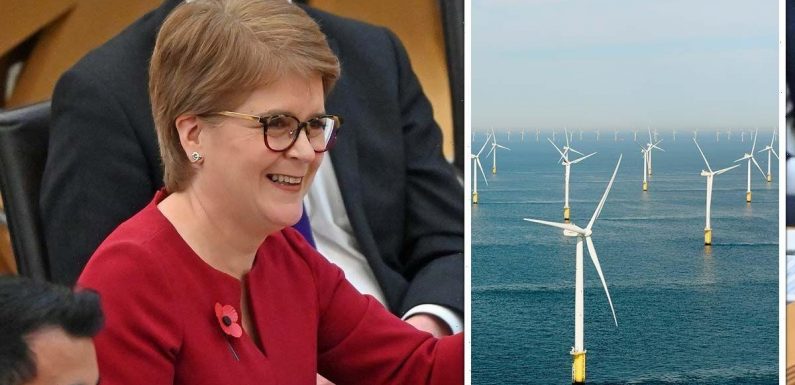
Scotland energy should 'serve Scotland's people' says Blackford
We use your sign-up to provide content in ways you’ve consented to and to improve our understanding of you. This may include adverts from us and 3rd parties based on our understanding. You can unsubscribe at any time. More info
First Minister Nicola Sturgeon’s dreams of Scottish Independence could be facing a major blow as Scotland is facing a lack of planners, which is threatening to delay the region’s green energy projects. Scotland is rich in renewable energy resources, particularly in the form of offshore wind farms in the North Sea. Previous SNP politicians, including Michael Matheson, Scotland’s Energy Secretary have hailed renewable energy sources, like hydrogen at the heart of the party’s plan to launch a second Independence Referendum. Experts note that Scotland’s bureaucracy is struggling to deal with the sheer volume of schemes that are now in development.
Writing in the Herald, David Leask said: “Scotland’s creaking and underfunded planning system is now unable to process the sheer volume of clean energy schemes needed to get the country to net zero, according to those involved in the process.”
Scotland is already a major clean energy generator, with 62 percent of the electricity produced coming from renewable sources. However, it still has a lot more work left when it comes to other uses of clean energy, like transportation and heating.
Mr Leask added: “To make this transition, experts reckon that by 2030 we need to install 12 gigawatts of wind turbines on land and another 10 gigawatts off shore, plus solar farms with a generating capacity of four gigawatts.”
Furthermore, Scotland will also need to increase its electricity storage capacity through batteries, which can help keep the country running during days when the wind isn’t blowing.


According to Mr Leask, this means that Scotland will need to build, among other infrastructure, pumped storage hydro projects in its hills.
He continued: “Basically, the country has to plan, fund and build twice as much renewables capacity by the end of the decade than has been put in place in the last 30 years.”
This means that there will be a lot of “red tape” involved to greenlight these projects. However “nobody in the industry really thinks we have enough town and country planners to do this – bluntly, due to cuts – especially senior, specialist ones”.
These are not easy decisions to make, as large-scale renewable schemes are decided by the government, while smaller ones are set by the local councils. Because of a shortage of planners, many of Scotland’s green projects could end up being tied up by red tape.

Craig McLaren, the director at the Royal Town Planning Institute (RTPI) told the Herald: “Large renewable schemes are often complex, major applications.
“They need the careful consideration of an effective and robust planning system to balance the needs of communities, nature and the green economy.
“But planners cannot be expected to do more with less in perpetuity. Stakeholders, including the renewables industry, have been very clear about the need to reverse the chronic underfunding of the planning system in Scotland.
“We will need to see adequate resources if we’re going to deliver the right renewables in the right places to help achieve net zero carbon targets in the places.”
DON’T MISS:
Mummified dinosaur with skin still intact after 67 million years [REPORT]
Israel eager for UK deal as Britain close to ‘Global Plan B’ [REVEAL]
UK’s 10-year plan to power boilers with the ‘most abundant element’ [INSIGHT]

Energy has played a major role in the SNP’s push for Scottish Independence, as Ian Blackford, the party’s Westminster leader recently saying that energy-rich Scotland would no longer have to share with the UK, resulting in stronger energy security and smaller bills.
Addressing the SNP Conference in Aberdeen, Mr Blackford said: “We know the scale of the opportunities that independence will offer. But we only have to look at the current context. Scotland is energy-rich – we simply shouldn’t be facing an energy emergency.
“We shouldn’t have cold homes and soaring bills. We produce six times more gas than we consume and nearly 100 percent of the equivalent of our electricity consumption already comes from renewables.
“This is Scotland’s energy and it should serve Scotland’s people.”
Source: Read Full Article